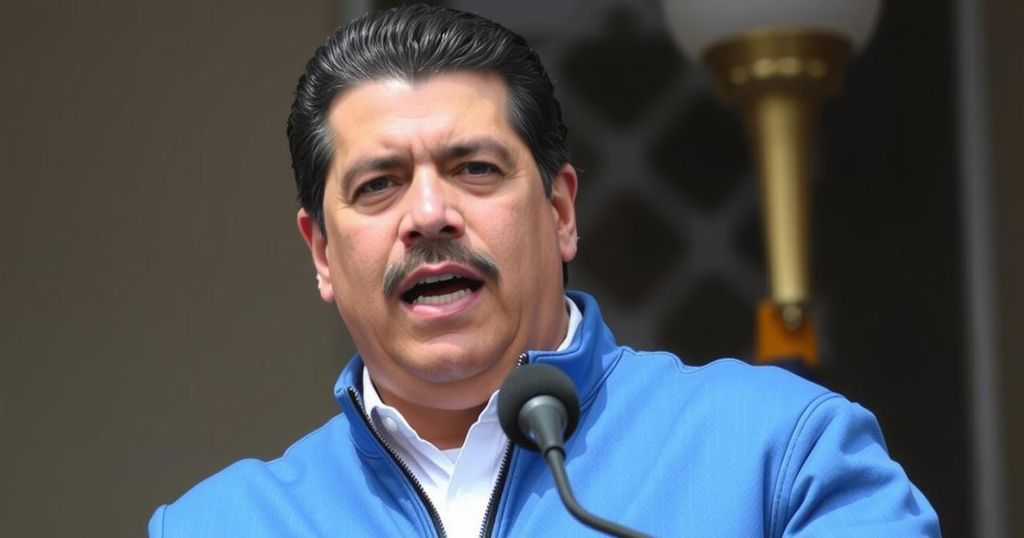Nicolás Maduro was sworn in for a controversial third term amidst disputed election results, with opposition leader Edmundo González claiming victory. Despite international scrutiny and protests from citizens, Maduro remains in power, though opposition efforts to pressure him continue to mount, highlighting the ongoing political crisis in Venezuela.
Venezuelan President Nicolás Maduro was inaugurated for a contentious third term on Friday amidst significant disputes over the results of the July presidential election. Despite international calls for him to resign, Maduro asserted his legitimacy, stating that his power derives from the Venezuelan Constitution and the will of the people. However, the election results reported by opposition leader Edmundo González, who claimed a decisive victory, were not acknowledged by Maduro or his administration, leading to widespread skepticism regarding the integrity of the electoral process.
The political landscape in Venezuela has become increasingly tumultuous since the July election. Although electoral authorities awarded Maduro the victory shortly after the polls closed, they did so without providing transparent vote counts, igniting doubts about the legitimacy of his claim. The opposition pooled data from more than 85 percent of electronic voting machines, indicating that Gonzalez had, in fact, won the election, a finding corroborated by independent election monitors, including those from the Carter Center and the Organization of American States.
The international community responded by recognizing González as the rightful president-elect and demanded that Maduro supply the necessary electoral documents to substantiate his claims. Resulting protests filled the streets of Venezuela, with demonstrators denouncing what they labeled a fraudulent electoral process. The government’s aggressive response led to the arrest of over 2,000 citizens and the deaths of at least 20 protesters, further exacerbating tensions within the nation.
In recent developments, combinations of repression against dissent have seen González flee to Spain, with other opposition figures like María Corina Machado being barred from political participation and forced into hiding. Leading up to Maduro’s swearing-in ceremony, encounters between protesters and security forces escalated, resulting in numerous arrests, including that of Machado during a rare public appearance.
Despite the national turmoil, Maduro pledged during his inauguration that his new term would herald a period characterized by peace and prosperity. Nonetheless, his record of manipulating elections and the silencing of opposition members raises serious doubts about the sincerity of his promises. As he consolidates power, González is rallying support across the Americas, aiming to exert pressure on Maduro to step down, although his plans for a return to power remain unclear.
In this charged political atmosphere, Maduro’s third term signifies a deepening crisis in Venezuela, where trust in democratic institutions is eroded and concerns about authoritarian governance loom large.
The political situation in Venezuela is fraught with tension and controversy, particularly following the July presidential elections. Nicolás Maduro, who has been in power since 2013, faces significant backlash, both domestically and internationally, due to allegations of election fraud and human rights abuses. The opposition, led by Edmundo González, has accused Maduro’s regime of undermining democracy and manipulating electoral outcomes. The geopolitical implications of Venezuela’s internal strife resonate beyond its borders, drawing attention from global leaders and organizations advocating for democratic governance.
In summary, Nicolás Maduro’s inauguration for a third term unfolds against the backdrop of disputed election results, heightened civil unrest, and an increasingly repressive political environment in Venezuela. The divergent claims of electoral victory between Maduro and González reflect a profound crisis of legitimacy, exacerbating existing tensions both within the country and on the international stage. As oppositional forces mobilize for support, the path forward remains uncertain, and Maduro’s capacity to maintain power will be severely tested amidst calls for democratic restoration.
Original Source: reason.com






